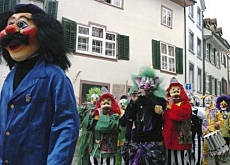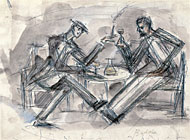Visiting Zurich – the village

Planning a trip to Switzerland's biggest city? A couple of expatriate Americans cut Zurich down to size and provide some practical travel tips.
swissinfo.ch lent an ear to an editor of a guidebook on Zurich for parents and a classical musician with a penchant for the works of former Zurich resident, James Joyce.
Andrea Bader Rusch is aghast when I suggest that Tibits – the vegetarian restaurant where we meet at her suggestion – is the Swiss version of an American fast food chain.
What I really want to know, without being very eloquent, is if she as an American expatriate feels more at home in a self-service bistro, a concept pioneered in the United States, than in a traditional Swiss diner.
“I just like the feel of the place,” she says. “It’s casual and lots of interesting people come here. I often bring my granddaughter and we sit in the [kids’] corner.”
It is not surprising then that Tibits is listed as one of Zurich’s children-friendly restaurants in Andrea’s book, “In and around Zurich with kids”.
But what does Tad Lauer think of the place? The New Age eatery certainly wasn’t around during the years his literary hero, James Joyce, roamed Zurich while writing Ulysses.
Legendary
I thought he would have found the James Joyce pub a more appropriate place to chat, or the legendary Kronenhalle restaurant, patronised by the who’s who of 20th century intellectuals including the Irish writer.
But the person who spends a few hours each Thursday dissecting Finnegan’s Wake word for word as a member of a Joyce reading group doesn’t think much of the pub since its refurbishment, and finds the Kronenhalle prices “prohibitive”.
So we order coffee at Tibits – Andrea a café au lait, Tad a double espresso and I a latte macchiato – and discuss what it is that puts Zurich top or near the top of most lists of the best places to live in the world, and why it is also such a great city to visit.
And what makes it so appealing for people of all ages and from all walks of life.
“It is an attractive city but it’s a village,” begins Andrea, who works as a consultant for a relocation firm and gives integration courses for newly arrived families. “For me Zurich is really a village and that’s part of the charm of the place. It’s a big city, yet a village. Does that make sense?”
Parkland
“Zurich definitely has this village component,” Tad says, continuing the thought. “It’s ringed by forests and there’s plenty of parkland within it. Each little part of town is unique and there is a quiet stability about it.”
To see the city in a day, Tad recommends taking the number nine tram that passes the university and one of the buildings where Joyce lived… “Then you have the Kunsthaus (city’s main art gallery) and Schauspielhaus (theatre) on the left, before continuing down to Bellevueplatz where suddenly you have the lake on the left and river on the right”.
His tour goes right, winding through the bohemian Niederdorf district, which he says is only a “stone’s throw” away from the Bahnhofstrasse, Zurich’s famous shopping mile of fashionable boutiques, and the city’s financial hub.
There would still be time left over, he adds, for a boat ride on the lake. “You can do it all without breaking into a sweat. That encapsulates this idea of it being a village but also an international city.”
The musician who plays with canton Aargau’s symphony orchestra says photographs of Zurich at the turn of the 20th century prove that Joyce would still recognise Zurich today.
Downtown Switzerland
“There’s a remarkable continuity in terms of the visual and architectural aspect of the ‘downtown’,” he says, playing on the city’s slogan “Downtown Switzerland”.
“There is a wealth of things to do for the whole family,” according to Andrea, when I ask her what is in it for kids. She says the best part of summer is being on the lake and visiting Zurich’s museums or zoo on rainy days.
She also recommends getting lost amid the city’s narrow streets and alleys. “I enjoy walking along the River Limmat, since I need water for my soul.”
“There are hidden places – you can always find a back alley, a little street here or there and something new to discover.
“My favourite thing is to go up on the ridges on either side of the lake and to come down. The view of the city and lake is exquisite,” she enthuses, saying that after 26 years in Switzerland, the sight “still hits me”.
I ask them what they think of the recent vote, which legitimised Sunday shopping at the country’s main railway stations and airports. The move has made ShopVille, the underground shopping concourse at the Zurich station very popular.
“They announced that it is a smoke-free zone which is significant to all of us clean air people,” Tad says, adding that he thinks Sunday shopping is a “good idea”.
Andrea disagrees. “I’d like to have one day a week when the shops are closed. I don’t want to turn Switzerland into the United States”.
The meeting took place at the self-service restaurant, Tibits, in Zurich.
Andrea Bader Rusch, who has lived in the Zurich region for 26 years, is a consultant specialising in assisting families who have relocated to Zurich. She has also written a book, “In and around Zurich with kids”.
Tad Lauer is a classical violinist and performs with canton Aargau’s symphony orchestra.
He is a member of a James Joyce reading group at the city’s James Joyce Foundation.
Basel is pharmaceuticals, Zurich banks and Geneva a diplomatic centre par excellence.
English is more than just a second language in these cities; it has helped define their characters in the modern age.
But what is it about these very international cities that has convinced so many native English speakers to put down roots?
swissinfo.ch speaks to expatriates in Basel, Zurich and Geneva about the places to see and the things to do in their adopted homes. The next report in the series will focus on Geneva.

In compliance with the JTI standards
More: SWI swissinfo.ch certified by the Journalism Trust Initiative













You can find an overview of ongoing debates with our journalists here . Please join us!
If you want to start a conversation about a topic raised in this article or want to report factual errors, email us at english@swissinfo.ch.